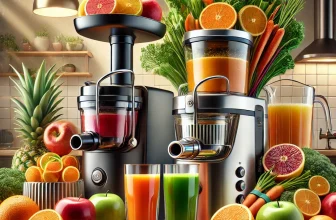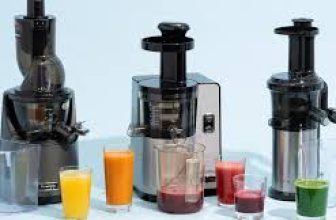As an Amazon Associate I earn from qualifying purchases.
Where To Buy Juicers
Where To Buy Juicers? Finding the perfect juicer can sometimes feel as overwhelming as navigating a bustling farmers’ market. With an array of options available, both online and in brick-and-mortar stores, knowing where to start your search is crucial. Ever wondered where top chefs source their high-quality juicers?
No products found.
Initially, specialized kitchen appliance retailers offer a wide range of juicers catering to both novice users and professionals. These stores often provide beneficial demonstrations, giving you the chance to see the juicer in action before committing. Additionally, e-commerce giants like Amazon provide extensive reviews and ratings, making it easier to gauge customer satisfaction and pinpoint the best device for your needs.
:max_bytes(150000):strip_icc()/Best-Cold-Press-Juicers-Tested-FW-Social-d23056545dd44c33814aecbc32f8bfee.jpg)
Where to buy juicers
When searching for the right place to buy a juicer, you have several options. Physical stores, like specialty kitchen shops and department stores, offer a chance to see and maybe even try the product before buying. This helps if you’re unsure about which brand or model to choose. Some stores also provide customer reviews and expert advice. However, the selection might be limited compared to online options.
Buying a juicer online presents a wider range of choices. Websites like Amazon and specialized cooking stores have extensive collections. They often feature detailed product descriptions, customer reviews, and comparison tools to aid your decision. While you can’t test the juicer yourself, these resources can significantly help. Plus, online shopping offers the convenience of home delivery.
Price can also influence where to buy a juicer. Physical stores might have higher prices due to overhead costs. In contrast, online retailers often have more competitive pricing and frequent discounts. It’s a good idea to check for sales, both in-store and online, to find the best deals. Adding shipping costs to online purchases is essential to assessing the final price.
Consider additional factors, such as return policies and warranties. Brick-and-mortar stores usually offer easy return processes. Additionally, some online retailers provide hassle-free return options with prepaid shipping labels. Warranties often come standard with many juicers, and knowing the terms can save you from future headaches. Carefully review these details before making your purchase.
Exploring brick-and-mortar stores
Visiting brick-and-mortar stores can be a rewarding experience when looking for a juicer. One of the main advantages is the ability to physically inspect the product. You can evaluate its size, weight, and overall build quality. Some stores even offer demonstrations, allowing you to see the juicer in action. This hands-on experience can significantly influence your buying decision.
Expert advice is another benefit of shopping in physical stores. Many specialty kitchen stores employ knowledgeable staff who can provide personalized recommendations. They can answer questions about different juicer models and their features. Additionally, in-store promotions and exclusive deals are common. These opportunities can lead to significant savings.
Brick-and-mortar stores also offer immediate gratification. Unlike online shopping, you can take your purchase home the same day. This is especially beneficial if you need the juicer for an event or want to start using it right away. There’s no waiting for shipping, and you can avoid potential delivery issues. However, the convenience of online shopping should not be overlooked.
However, physical stores can have some drawbacks. The selection might be more limited compared to online options. Retail space constraints mean they can’t stock every brand and model. Additionally, prices in physical stores can sometimes be higher due to operating costs. It’s wise to compare prices both in-store and online before making your final decision.
Advantages and Disadvantages of buying juicers from physical stores
One advantage of buying a juicer from a physical store is the ability to see and touch the product before purchase. This tactile experience helps you gauge the build quality and ease of use. Additionally, some stores offer demonstrations, allowing you to see the juicer in action. These factors collectively ensure that you are getting a product that meets your needs. It can build confidence in your purchase decision.
Another significant benefit is the in-person customer service. Store employees can provide expert advice tailored to your requirements. They can help answer specific questions you might have about different models. Plus, if something goes wrong, you can easily return or exchange the product. Immediate help is often available, making the process smoother.
However, shopping at physical stores has its drawbacks. One of the most notable disadvantages is the limited selection. Stores have to manage their inventory and can’t offer every model on the market. This limitation might restrict your choices. Instead of finding the perfect juicer, you might have to settle for what’s available.
Price is another potential downside. Physical stores usually have higher operating costs, which can translate into higher prices for consumers. While you might find occasional in-store promotions, these deals don’t always match online discounts. It’s essential to compare both online and offline prices to ensure you’re getting the best value. Evaluating all these factors can guide your purchase decision.
Buying juicers Online: Options and Features
Online shopping for juicers offers a plethora of options that you might not find in physical stores. Websites like Amazon, Walmart, and specialized kitchen appliance sites provide an extensive range of brands and models. Detailed descriptions, customer reviews, and comparison tools are often available on these platforms. These resources help you make a well-informed decision. You can easily filter products by price, ratings, and features.
One key advantage of buying juicers online is the ability to read customer reviews. These reviews often reveal the pros and cons based on real user experiences. Additionally, ratings provide a snapshot of overall satisfaction. This helps you avoid products with poor performance or frequent issues. Comprehensive reviews and ratings make the decision-making process straightforward.
Online stores frequently offer competitive pricing and discounts. Many websites provide exclusive online offers and flash sales that can save you money. Coupons and discount codes are other ways to reduce costs. Sometimes, free shipping is available, adding to the overall savings. Price comparison websites also make it easy to find the best deal.
Beyond price and reviews, the convenience of online shopping is unbeatable. You can browse and buy a juicer from the comfort of your home without any time constraints. Online stores are open 24/7, allowing you to shop at any hour. Plus, the juicer gets delivered directly to your doorstep. This eliminates the need to physically visit a store.
Many online retailers offer excellent return policies and warranties. If you are not satisfied with your purchase, most online stores allow you to return the item easily. Some even provide prepaid shipping labels for returns. Before buying, it’s wise to review the return policy. Confirming these details ensures a hassle-free shopping experience.
Here is a quick comparison of features you can look for when buying a juicer online:
| Feature | Details |
|---|---|
| Motor Power | Higher wattage for tougher fruits and vegetables |
| Types | Centrifugal, masticating, or triturating |
| Size | Compact or full-sized models |
| Extras | Attachments and additional features |
Tips for buying the best juicer for your needs
When selecting the perfect juicer, consider the types of fruits and vegetables you’ll be juicing. If you plan to juice mostly leafy greens, a masticating juicer is your best bet. For harder fruits and vegetables, a centrifugal juicer may work better. Knowing what you want to juice will help narrow down your choices. This can save you time and money.
Think about your budget before making a purchase. Juicers can range in price from under $50 to over $500. High-end models often come with more robust features and better durability. However, mid-range juicers can offer excellent performance for less. Setting a budget ahead of time will guide your purchase and ensure you don’t overspend.
Consider the ease of use and cleaning. Some juicers are more user-friendly and easier to clean than others. Look for models with fewer parts and dishwasher-safe components. This can make your juicing experience more enjoyable and less time-consuming. A juicer that’s easy to clean will likely be used more often.
Check for additional features that match your needs. Some juicers come with attachments for making nut milk or sorbet. Others have various speed settings for different types of produce. Features like an automatic pulp ejection can also be beneficial. Make a list of must-have features before shopping.
Read user reviews and expert opinions. Online reviews can provide valuable insights into a juicer’s performance and reliability. Expert reviews often highlight the pros and cons of different models. This information can help you make an informed decision. Take the time to read a few reviews before making your final choice.
Here is a comparison of common juicer features to look for:
| Feature | Importance |
|---|---|
| Motor Power | High: Essential for tough produce |
| Ease of Cleaning | High: Influences frequency of use |
| Noise Level | Medium: Important for quiet environments |
| Speed Settings | Medium: Versatility for different produce |
| Additional Attachments | Low: Nice to have but not essential |
Frequently Asked Questions
Finding the right juicer can be challenging, so we’ve compiled a list of common questions. These answers will help you make an informed decision.
1. What types of juicers are available?
The main types of juicers are centrifugal, masticating, and triturating. Centrifugal juicers use fast-spinning blades to extract juice quickly, making them ideal for hard fruits and vegetables. Masticating juicers operate at a slower speed but produce higher yields, preserving more nutrients.
Triturating juicers feature twin gears that crush produce thoroughly to maximize juice extraction. They are suitable for various fruits, vegetables, and leafy greens. Each type has its unique advantages depending on your specific needs.
2. How do I choose the right juicer for me?
Consider what you’ll be juicing most frequently when choosing a juicer. If you plan to juice mostly hard fruits and vegetables, a centrifugal juicer may be best. For leafy greens and nuts, opt for a masticating or triturating model.
Think about ease of cleaning and how often you’ll use the machine. Some models are easier to clean than others, which can impact how often you use them. Reading customer reviews can also provide valuable insights into each type’s performance.
3. Are expensive juicers worth the investment?
Expensive juicers often come with advanced features like multiple speed settings and durable components. These features can lead to better juice quality and longer lifespan of the machine itself.
If you’re serious about regular juicing, investing in a high-quality model could be worthwhile. However, good mid-range options are available that perform well without breaking the bank.
4. How often should I replace my juicer parts?
The frequency of replacing parts depends largely on usage and maintenance habits. For heavy users, certain components might need replacement every few months to maintain optimal performance.
A well-maintained machine used moderately might only require part replacements once or twice a year. Always follow manufacturer guidelines for maintenance to extend your machine’s longevity.
5.Are there any safety tips for using a juicer?
Makes sure to read the user manual before operating your new machine fully understand its functions first Avoid forcing items into the feed chute since this action may damage internal mechanisms .
Conclusion
To find the perfect juicer, consider both online and brick-and-mortar store options. Each has unique advantages depending on your needs and preferences. Weighing these factors ensures a well-informed purchase decision. Remember, the best juicer is one that fits your lifestyle and budget.
Customer reviews and expert advice can provide valuable insights into different models. Prioritize what matters most to you, whether it’s ease of cleaning, juice quality, or durability. Investing time in research will pay off with a juicer you’ll love using for years to come.






